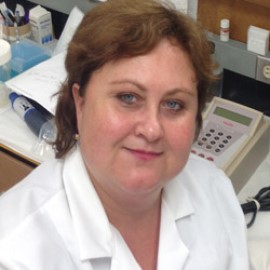
Lyudmila I. Rachek, Ph.D.
Biography
Dr. Lyudmila "Luda" Rachek, Assistant Professor, received her Master of Science in Molecular Biology from Kiev State University, Kiev, Ukraine, her Ph.D. in Molecular Biology from Ukrainian Academy of Sciences, Kiev, Ukraine, and completed her postdoctoral fellowship in Molecular Biology and Microbiology at the Frederick P. Whiddon College of Medicine.
Research
The main interest of my research is to explore the different aspects of the role of mitochondrial DNA (mtDNA) damage and repair for the mitochondrial function and thus for overall cell function and survival. Obesity is associated with insulin resistance and this represents a major risk factor for metabolic syndrome, type 2 diabetes and cardiovascular complications. Mitochondria are the primary site of fuel metabolism and ATP production. Apart from producing energy, mitochondria also are a major source of ROS. Currently, the research in my lab focuses in the following areas: 1) to identify mechanisms involved in the obesity-induced mitochondrial DNA (mtDNA) damage, cell free mtDNA and mitochondrial dysfunction; 2) to regulate maintenance of mtDNA integrity as a novel approach for treatment of obesity-induced induced insulin resistance and metabolic syndrome.
We are now working on the developing experimental approaches to target DNA repair enzymes to mitochondria in an effort to more precisely define the role of mtDNA damage in the pathogenesis of diabetes complications. This includes collaborative studies for the role of mtDNA damage and repair in diabetes-associated endothelial dysfunction and vasculopathy. Overall, our studies have potential therapeutic benefit for the treatment of the secondary complications resulting from obesity, insulin resistance and diabetes.
Publications
Yuzefovych L.V, Pastukh V. M., Madhuri S. Mulekar M.S., Ledbetter K., Richards W.O, Rachek L.I. Effect of bariatric surgery on plasma cell-free mitochondrial DNA, insulin sensitivity and metabolic changes in obese patients. Biomedicines, 11, 2514, 2023. doi: 10.3390/biomedicines11092514. PMID: 37760955.
Irelan D, Boyd A, Fiedler E, Lochmaier P, McDonough W, Aragon IV, Rachek L, Abou Saleh L, Richter W. Acute PDE4 Inhibition Induces a Transient Increase in Blood Glucose in Mice. Int J Mol Sci. 2023 Feb 7;24(4):3260. doi: 10.3390/ijms24043260. PMID: 36834669.
Kim SJ, Cheresh P, Jablonski RP, Rachek L, Yeldandi A, Piseaux-Aillon R, Ciesielski MJ, Ridge K, Gottardi C, Lam AP, Pardo A, Selman M, Natarajan V, Kamp DW. Mitochondrial 8-oxoguanine DNA glycosylase mitigates alveolar epithelial cell PINK1 deficiency, mitochondrial DNA damage, apoptosis, and lung fibrosis. Am J Physiol Lung Cell Mol Physiol. 2020 May 1;318(5):L1084-L1096. doi: 10.1152/ajplung.00069.2019. Epub 2020 Mar 25. PMID: 32209025.
Yuzefovych LV, Pastukh VM, Ruchko MV, Simmons JD, Richards WO, Rachek LI. Plasma mitochondrial DNA is elevated in obese type 2 diabetes mellitus patients and correlates positively with insulin resistance. PLoS One. 2019 Oct 10;14(10):e0222278. doi: 10.1371/journal.pone.0222278. eCollection 2019.PMID: 31600210.
Scheffler K, Rachek L, You P, Rowe AD, Wang W, Kuśnierczyk A, Kittelsen L, Bjørås M, Eide L. 8-oxoguanine DNA glycosylase (Ogg1) controls hepatic gluconeogenesis. DNA Repair (Amst). 2018 Jan;61:56-62. doi: 10.1016/j.dnarep.2017.11.008. Epub 2017 Nov 28. PMID: 29207315.


